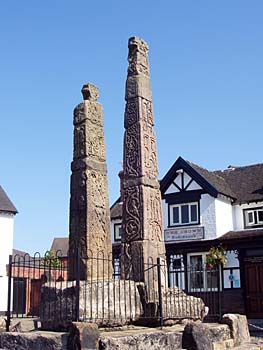 |
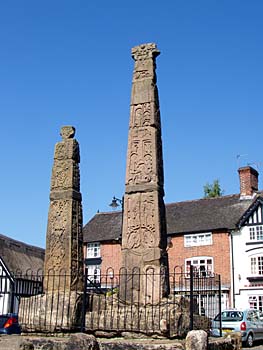 |
|
| From the South | From the South East | |
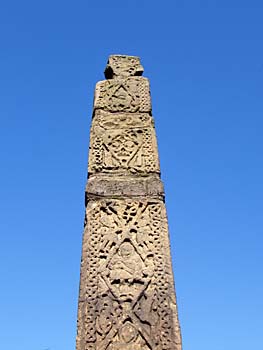 |
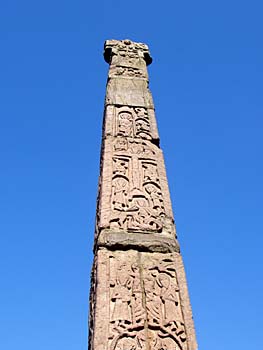 |
|
| Detail of smaller cross | Detail of larger cross | |
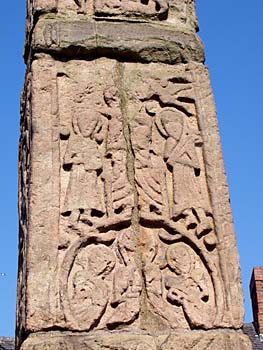 |
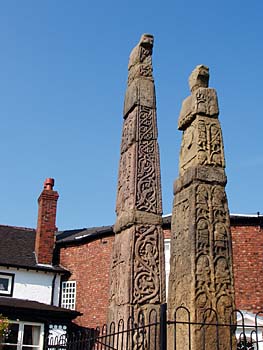 |
|
| Lower panel of larger cross | View from South West |
 |
 |
|
| From the South | From the South East | |
 |
 |
|
| Detail of smaller cross | Detail of larger cross | |
 |
 |
|
| Lower panel of larger cross | View from South West |
The pictures shown above were taken in the middle of the morning and in the late afternoon so as to capture three of the faces in good light. The story of the Sandbach crossed turns out to be complicated. John Minshull, in his account of St. Mary's at Sandbach, gives some of the early history of the area. He relates that the inhabitants were converted by four Northumbrian priests in about 653 AD. They are believed to have arrived in Sandbach at about the same time as Peada, son of Penda King of Mercia, who was returning from a visit to Oswy, King of Northumbria. Peada wanted to marry Oswy's daughter, Alchfleda, and was allowed to do so provided that he converted to Christianity. John Minshull states:
"His conjectured conversion took place in the market square and probable baptism down at the brook. Peada is subsequently said to have financed the erection of the crosses to commemorate his conversion to Christianity, the larger obelisk picturing some of the principal events in Christ's life, whilst the smaller pillar probably depicts Peada's conversion and some historical events of the period.
Minshull may have repeated the account in Tomlinson's book of 1899 On the History of Sandbach, which in turn relies partly on the Northumbrian historian, the Venerable Bede. Tomlinson states:
"The period when these Crosses were erected is uncertain, but in some instances it is supposed that they were erected about the year A.D 653, when Peada, (King Penda's son), returned a Christian convert from Northumbria to Mercia, attended, according to Bede, by four Priests, who were deputed to preach the Gospel through his dominions. Bede, in his Ecclesiastical History of the Nation of the Angles states that the names of these Priests were Adda, Cedda, Betti and Diuma. They are supposed to have preached at Sandbach, and to have baptized Peada and the members of his Court, on the spot where the Crosses now stand.
This statement is deceptive as it appears to give Bede as the source of the local tradition that Paeda was baptised at Sandbach. However, what Bede actually states, as shown in the appendix below, is that Peada was baptised by Finan (Bishop of Lindisfarne) at a township called At-the-Wall, which may be Walton, near Newcastle. Of the four priests who travelled south, Diuma became bishop of the Mercians and Middle Angles, settling at the Mercian capital, Repton. Cedd was soon recalled to Northumberland, and was to have a later mission to East Anglia. Tradition says Betti founded the church at Wirksworth. It is not clear what happened to Adda. However, none of these priests is Finan, Bishop of Lindisfarne. One has to wonder why Paeda, returning to Mercia as a Christian convert, was not baptised until he reached Sandbach or why he had to be converted in Sandbach if he had already been baptised by the Bishop of Lindisfarne.
Bede is widely held to be the first true historian of Britain rather than a teller of tales. His account is clearly contrary to the Sandbach tradition, which lacks documentary support. However, it remains that the Sandbach crosses are very remarkable and must have been erected by a powerful person to commemorate a very significant event. An account of the details of the crosses, their later history and restoration can be read on the Alsager site.
King Oswald of Northumbria and his brother King Oswy, King Penda of Mercia and his son Peada crop up variously in the histories of Brereton, Malpas, Ashbourne and Breedon on the Hill covered on my sites.
A Short History and Description: St. Mary's Church, Sandbach, Cheshire,
by John Minshull, published by the St. Mary's Parochial Church Council, 1st
edtion Jun 1974, revised June 1990
Anglo Saxon Chronicle translated by Rev. James Ingram (London, 1823),
with additional readings from the translation of Dr. J.A. Giles (London, 1847)
History of Sandbach and District by R. W. Tomlinson 1899, quoted
on Alsager website
The Ecclesiastical History of Britain by Bede, translated
by A. M. Sellar. .
1. The Anglo Saxon Chronicle
Both the Anglo Saxon Chronicle and Bede refer to the conversion of the Middle Angles who occupied a part of Mercia in AD 653. Bede remarks in his chapter for 655 that the River Trent separated North Mercia from South Mercia. Peada had been given the task of ruling the Middle Angles by his father, Penda King of Mercia.
The Anglo-Saxon Chronicle gives the following entries for some of these events but does not mention the location of Paeda's baptism. Note that for AD 642, other accounts place Oswald's death at the Battle of Oswestry rather than Mirfield, which is near Wakefield in Yorkshire. The marriage of Paeda to Elfleda was not a success as within a year of him becoming King of Mercia he was killed as a result of her betrayal..
A.D. 642. This year Oswald, king of the Northumbrians, was slain by Penda, king of the Southumbrians, at Mirfield, on the fifth day of August; and his body was buried at Bardney. His holiness and miracles were afterwards displayed on manifold occasions throughout this island; and his hands remain still uncorrupted at Barnburgh. The same year in which Oswald was slain, Oswy his brother succeeded to the government of the Northumbrians, and reigned two less than thirty years.
A.D. 653. This year, the Middle-Angles under alderman Peada received the right belief. (Alderman was the title equivalent to Earl used later by the Saxons)
A.D. 655. This year Penda was slain at Wingfield, (in a battle with King Oswy of Northumberland) and thirty royal personages with him, some of whom were kings. One of them was Ethelhere, brother of Anna, king of the East-Angles. The Mercians after this became Christians. From the beginning of the world had now elapsed five thousand eight hundred and fifty winters, when Peada, the son of Penda, assumed the government of the Mercians. In his time came together himself and Oswy, brother of King Oswald, and said, that they would rear a minster to the glory of Christ, and the honour of St. Peter. And they did so, and gave it the name of Medhamsted; because there is a well there, called Meadswell. And they began the groundwall, and wrought thereon; after which they committed the work to a monk, whose name was Saxulf. He was very much the friend of God, and him also loved all people. He was nobly born in the world, and rich: he is now much richer with Christ. But King Peada reigned no while; for he was betrayed by his own queen, in Easter-tide.
A.D. 656. This year was Peada slain; and Wulfhere, son of Penda, succeeded to the kingdom of the Mercians. In his time waxed the abbey of Medhamsted very rich, which his brother had begun. The king loved it much, for the love of his brother Peada, and for the love of his wed-brother Oswy, and for the love of Saxulf the abbot.
2. Bede's Ecclesiastical History of England
From CHAP. IX
How miracles of healing have been frequently wrought in the place where King Oswald was killed; and how, first, a traveller's horse was restored and afterwards a young girl cured of the palsy. [642]
Oswald was killed in a great battle, by the same pagan nation and pagan king of the Mercians, who had slain his predecessor Edwin, at a place called in the English tongue Maserfelth, in the thirty-eighth year of his age, on the fifth day of the month of August
From CHAP. XXI. How the province of the Midland Angles became Christian under King Peada. [653 A.D.]
AT this time, the Middle Angles, that is, the Angles of the Midland country (probably Leicestershire) under their Prince Peada, the son of King Penda, received the faith and mysteries of the truth. Being an excellent youth, and most worthy of the name and office of a king, he was by his father elevated to the throne of that nation, and came to Oswy, king of the Northumbrians, requesting to have his daughter Aichfled given him to wife; but he could not obtain his desire unless he would receive the faith of Christ, and be baptized, with the nation which he governed. When he heard the preaching of the truth, the promise of the heavenly kingdom, and the hope of resurrection and future immortality, he declared that he would willingly become a Christian, even though he should not obtain the maiden; being chiefly prevailed on to receive the faith by King Oswy's son Alchfrid, who was his brother-in-law and friend, for he had married his sister Cyneburg, the daughter of King Penda.
Accordingly he was baptized by Bishop Finan, with all his his nobles and thegns,and their servants, that came along with him, at a noted township, belonging to the king, called At the Wall. And having received four priests, who by reason of their learning and good life were deemed proper to instruct and baptize his nation, he returned home with much joy. These priests were Cedd and Adda, and Betti and Diuma; the last of whom was by nation a Scot, the others English. Adda was brother to Utta, whom we have mentioned before, a renowned priest, and abbot of the monastery which is called At the Goat's Head. The aforesaid priests, arriving in the province with the prince, preached the Word, and were heard willingly; and many, as well of the nobility as the common sort, renouncing the abominations of idolatry, were daily washed in the fountain of the faith.
Nor did King Penda forbid the preaching of the Word even among his people, the Mercians, if any were willing to hear it; but, on the contrary, he hated and despised those whom he perceived to be without the works of faith, when they had once received the faith of Christ, saying, that they were contemptible and wretched who scorned to obey their God, in whom they believed. These things were set on foot two years before the death of King Penda.
From CHAP. XXIV. How when King Penda was slain, the province of the Mercians received the faith of Christ, and Oswy gave possessions and territories to God, for building monasteries, as a thank offering for the victory obtained. [655 A.D.]
At this time, King Oswy was exposed to the cruel and intolerable invasions of Penda, king of the Mercians, whom we have so often mentioned, and who had slain his brother; at length, compelled by his necessity, he promised to give him countless gifts and royal marks of honour greater than can be believed, to purchase peace; provided that he would return home, and cease to waste and utterly destroy the provinces of his kingdom. The pagan king refused to grant his request, for he had resolved to blot out and extirpate all his nation, from the highest to the lowest; whereupon King Oswy had recourse to the protection of the Divine pity for deliverance from his barbarous and pitiless foe, and binding himself by a vow, said, "If the pagan will not accept our gifts, let us offer them to Him that will, the Lord our God." He then vowed, that if he should win the victory, he would dedicate his daughter to the Lord in holy virginity, and give twelve pieces of land whereon to build monasteries. After this he gave battle with a very small army: indeed, it is reported that the pagans had thirty times the number of men; for they had thirty legions, drawn up under most noted commanders. King Oswy and his son Alchfrid met them with a very small army, as has been said, but trusting in Christ as their Leader; his other son, Egfrid was then kept as a hostage at the court of Queen Cynwise, in the province of the Mercians. King Oswald's son Oidilwald, who ought to have supported them, was on the enemy's side, and led them on to fight against his country and his uncle; though, during the battle, he withdrew, and awaited the event in a place of safety. The engagement began, the pagans were put to flight or killed, the thirty royal commanders, who had come to Penda's assistance, were almost all of them slain; among whom was Ethelhere, brother and successor to Anna, king of the East Angles. He had been the occasion of the war, and was now killed, having lost his army and auxiliaries. The battle was fought near the river Winwaed, which then, owing to the great rains, was in flood, and had overflowed its banks, so that many more were drowned in the flight than destroyed in battle by thc sword.
Diuma was made the first bishop of the Mercians, as also of Lindsey and the Midland Angles, as has been said above, and he died and was buried among the Midland Angles. The second was Ceollach, who, giving up his episcopal office before his death, returned into Scotland. Both these bishops belonged to the nation of the Scots. The third was Trumhere, an Englishman, but educated and ordained by the Scots. He was abbot of the monastery that is called Ingetlingum, and is the place where King Oswin was killed, as has been said above; for Queen Eanfled, his kinswoman, in expiation of his unjust death, begged of King Oswy that he would give Trumhere, the aforesaid servant of God, a place there to build a monastery, because he also was kinsman to the slaughtered king; in which monastery continual prayers should be offered up for the eternal welfare of the kings, both of him that was murdered, and of him that commanded the murder. The same King Oswy governed the Mercians, as also the people of the other southern provinces, three years after he had slain King Penda; and he likewise subdued the greater part of the Picts to the dominion of the English.
At this time he gave to the above-mentioned Peada, son to King Penda, because he was his kinsman, the kingdom of the Southern Mercians, consisting, as is said, of 5,000 families, divided by the river Trent from the Northern Mercians, whose land contains 7,000 families; but Peada was foully slain in the following spring, by the treachery, as is said, of his wife, during the very time of the Easter festival. Three years after the death of King Penda, the Mercian chiefs, Immin, and Eafa, and Eadbert, rebelled against King Oswy, setting up for their king, Wulfhere,son to the said Penda, a youth whom they had kept concealed; and expelling the ealdormen of the foreign king, they bravely recovered at once their liberty and their lands; and being thus free, together with their king, they rejoiced to serve Christ the true King, for the sake of an everlasting kingdom in heaven. This king governed the Mercians seventeen years, and had for his first bishop Trumhere, above spoken of; the second was Jaruman; the third Ceadda; the fourth Wynfrid. All these, succeeding each other in order under King Wulfhere, discharged episcopal duties to the Mercian nation.